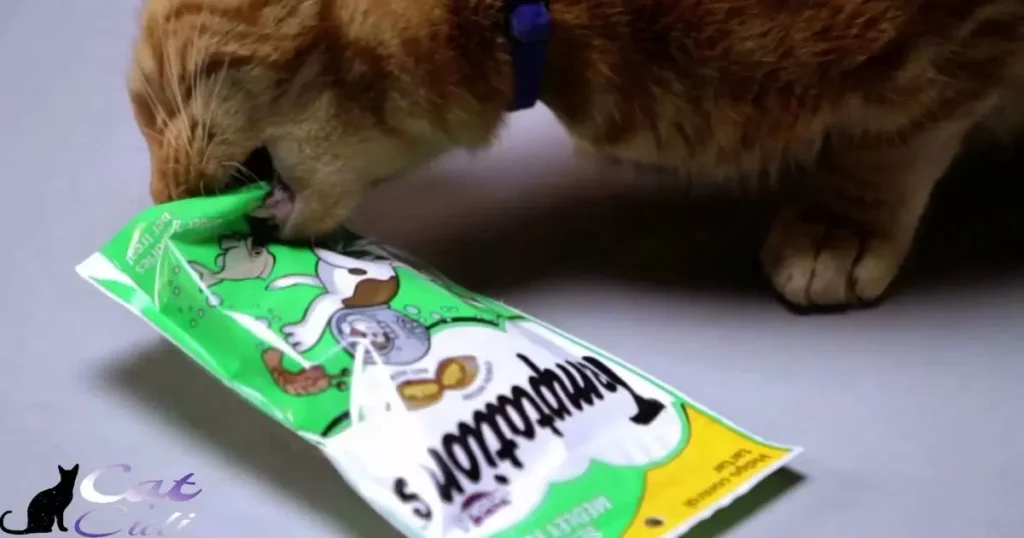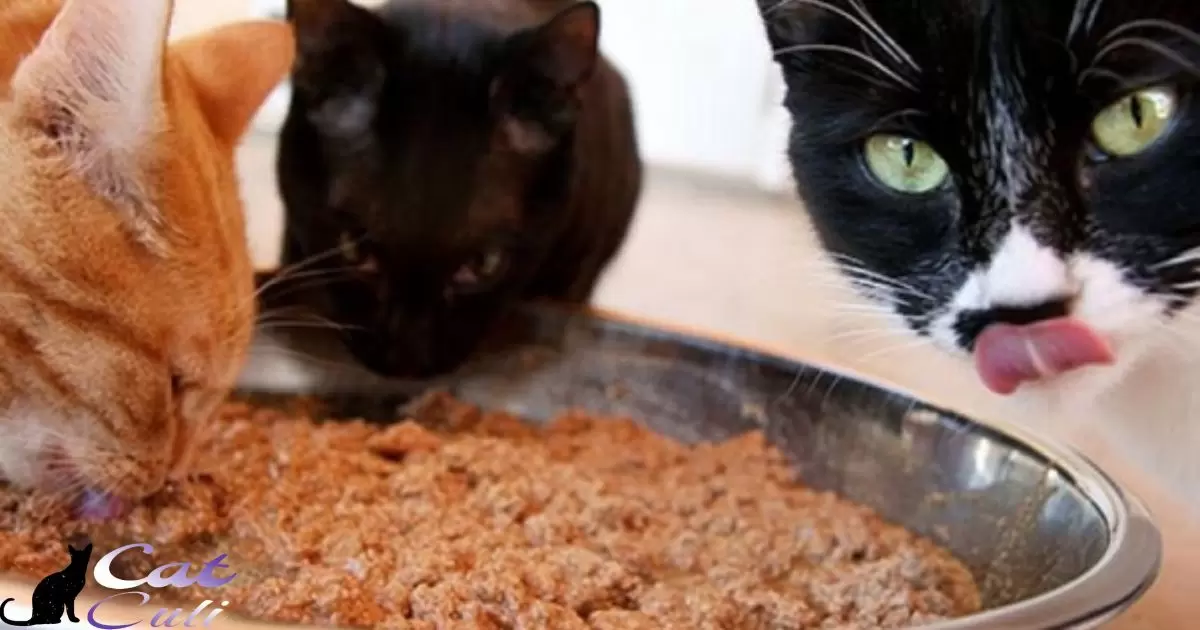Adult cats eating kitten food refers to full grown cats consuming dry or wet food meant for kittens. Kitten foods provide higher fat and energy levels to support growth in younger cats. While the taste may appeal to adults, their nutritional needs differ from kittens.
“Can Adult Cats Eat Kitten Food?” is a common question many cat owners have. While kitten food may seem more tempting or fun for adult cats used to regular food, it’s important to understand the impacts of this dietary change on their long term health and wellbeing.
While adult cats will usually happily eat kitten food, their bodies do not have the same requirements as growing kittens. Kitten foods contain higher protein levels to support muscle development in young pets. Too much ongoing protein as adults could put strain on organs like the liver and kidneys over time. It’s best to feed cats an appropriate diet for their life stage.
Nutritional Differences in Cat Food
Kitten and adult cat foods differ in important nutrients. Kitten food supports growth needs while adult formulations sustain health. Feeding the wrong food risks nutritional imbalance or health issues over time.
It’s important to understand nutritional variances when deciding diet.
What Nutrients Do Kittens Need From Kitten Food?
Protein builds muscles and organs in growing kittens. Calcium forms strong bones and teeth. Fat provides energy for activity and play. Vitamins and minerals support all body functions during development. These needs decline as cats become adults.
Kitten food has precisely balanced more of such key growth nutrients. Too much as adults could disrupt normal organ maturity or damage fully grown ones.
How Do Adult Cat Food Nutrients Differ?
Adult formulations focus on maintenance, not growth. Protein amounts meet daily needs but not fast growth. Calories match adult energy levels, not kittens’ high activity. Fat levels don’t promote weight gain in sedentary indoor cats.
Nutrients remain balanced for organ health and activity levels, minimizing excess strain on kidneys or liver from overfed nutrients no longer required for growth. This avoids potential health issues later in life.
Could Too Much Protein Harm Adult Cats?
Extra protein strains the kidneys as they work harder removing nitrogen waste. Over time this can lead to chronic kidney disease in at-risk cats. Excess protein may also tax the liver, causing damage when digestion can’t fully break it down.
Most cats don’t show immediate issues, Canned Food To Feed A Cat but prolonged high protein damages organs slowly without cause. Feeding proper diets avoids such unnecessary risks as cats age.
Kitten Food Calories Appropriate For Adults
| Kitten Food Calories | Adult Cat Needs |
| Kitten foods contain higher calories and fat to fuel | Adult cats needs are lower as they are |
| rapid growth and activity levels in kittens. | less active with non-growth energy demands. |
| Their calorie requirements decrease dramatically | Too many calories from kitten food risks |
| once mature. | weight gain issues for indoor pet cats. |
| Kitten calories are tailored for burn-off in play, | Maintaining a healthy weight is vital for |
| not sedentary lifestyles of many housecats. | an adult cat’s well-being long term. |
Taste Temptations of Kitten Food

Kitten foods tend to have stronger, meatier tastes cats enjoy. However, health depends more on balanced nutrition than flavor alone.
Why Do Adult Cats Seem To Prefer Kitten Food Flavors?
Kitten foods contain higher fat and palatable meat protein levels making them taste great. However, cats don’t consider long term health impacts of their food preferences. Owners must carefully select foods addressing nutritional needs over taste temptations.
Will Their Liking For Kitten Food Cause Health Issues?
While an occasional kitten food treat likely won’t harm healthy adults, daily kitten diet intake risks imbalances. Over time this could lead to problematic weight gain,organ strain or issues as aging cat metabolism slows down. It’s best to stick to an adult recipe as the main food.
How To Transition Cats To Proper Diet If Picky?
Gradually mix increasing portions of new food in with the old over 1-2 weeks. Cats adjust better slowly thanks to their strong sense of smell. Reward cats for eating the new food with praise. Be patient – most will adapt to a balanced recipe. Consistency is key so don’t give in to meowing for kitten food.
When Is Occasional Kitten Food As A Treat Okay?
In moderation, an occasional bite of kitten food won’t cause issues for healthy weight adult cats. As a rare treat no more than 10% of calories, it poses minimal risks if the cat mostly eats a balanced maintenance diet. But it’s best avoided if health problems already exist.
Life Stage Requirements in Cat Food
A cat’s nutritional needs change as they age just as people’s do. Accounts must be taken for growth, maturity and senior life stages.
Recipes tailored to pets’ life stages improve health compared to one-diet-for-all approaches.
Do All Cats Have The Same Dietary Needs Throughout Life?
No, just as people’s bodies are different as children versus adults, cats requirements change. Kittens need intensive growth nutrients, adults sustainment, and seniors may need help with mobility issues or digestive sensitivities. Tailoring recipes respects each pet’s natural stages.
What Changes About Senior Cat Food?
Senior foods ease age-related pains through supplements for joints, brain, eyes and skin. Digestion sometimes slows, requiring easier kibble or wet chunks. Some cats become sensitive to certain ingredients too. These recipes keep elders active and comfortable.
Why Do Adult And Kitten Cat Food Recipes Differ?
Kittens need high protein/fat/calcium/energy to support rapid growth and activity levels. Adults maintain healthy body weights and functions. They no longer have growth demands on their systems. Tailored recipes avoid over- or under-nutrition.
How To Identify The Best Cat Food At Each Stage?
Look for recipes proudly proclaiming stages like “kitten” or “adult maintenance” made by reputable brands. Ingredients and guaranteed analyses on labels confirm recipes meet the life stage demands in nutrients. Consult your vet if unsure of a cat’s requirements.
Health Risks of Long Term Kitten Food
While occasional kitten noms don’t hurt, extended intake ties serious risks to adulthood like protein poisoning the liver or kidneys face processing excess amounts daily without growth needs. Over time this silently damages organs.
May Excess Protein Harm Kidney Or Liver Function?
Yes, kidneys work hard removing nitrogenous wastes from protein. Too much strains them without reason since adults utilize protein simply for daily needs versus growth spurt demands. Over-burdened filtering systems show failures later in life.
Could Too Much Fat Lead To Weight Gain In Adults?
Excess calories readily convert to fat if an indoor cat gets limited exercise versus a kitten’s energy demands. Gaining weight stresses joints and takes bigger tolls on insulin levels controlling blood sugar – risks rise for diabetes down the track.
What Other Issues Can Arise From Wrong Cat Food?
Mismatched recipes may cause skin issues, diarrhea or constipation due to intolerances. Seniors need specialized joint/dental aids not in generic recipes. Pets’ quality of life and expected lifespan strongly links to lifetime diet care.
When To See The Vet About Food-Related Health Problems?
Visiting the vet is wise if a cat loses interest in eating, shows chronic diarrhea or constipation, skin troubles, weight loss or gains, lethargy or other changes not explained by situations at home. Professional checkups catch issues early for best treatment chances.
Best Food Options For Adult Cats

Reputable brands formulate recipes stuffed only with premium proteins and nutrients adult cats require for sustained wellness, avoiding fillers upsetting digestion.
What To Look For In High-Quality Adult Cat Foods?
Ingredients like chicken, salmon or beef provide easy to digest meat protein and essential fatty acids. Supplements cover daily vitamin/mineral needs. “Adult” clearly listed ensures balanced nutrition without nonessential extras.
Benefits To Grain-Free Or Raw Cat Diets
5 short benefits of grain-free or raw cat diets
- More natural diet – Raw/grain-free diets resemble what cats ate naturally by eliminating plant-based ingredients.
- Digestive health – Cats find meat-focused recipes easier to digest than plant-mixed kibble. This supports intestinal health.
- Shiny coat – Protein-rich, moisture-full raw feeding nourishes skin and fur for a beautiful glossy coat.
- Dental hygiene – Crunchy kibble or bones in raw diets help scrub teeth and reduce dental disease risks.
- Weight control – With fat/protein satisfying hunger, cats feel full on less and maintain steady weights without eating extra.
How Much Should Adults Eat Versus Kittens?
Most adult cats need 1/3 to 1/2 cups daily maximum depending on size and activity, divided into 2 meals. Monitor weight and adjust. Kittens require over double for rapid growth demands.
Getting Cats To Transition To An Appropriate Diet
Gradually incorporate new food by mixing small portions in over a few weeks. Most cats adapt fine once comfortable it’s permanent, though some fuss. Be patient and consistent – they’ll adjust for their health in the long run.
Frequently Asked Question
What Nutrient Differences Exist Between Kitten And Adult Cat Food?
Kitten foods contain more protein, fat, vitamins and minerals to support rapid growth while adult diets focus on maintenance needs.
Why Do So Many Cats Seem To Prefer The Taste Of Kitten Food?
Kitten foods usually contain higher fat and palatable meat protein levels making them taste better to cats who don’t comprehend long term health impacts of diet preferences.
Is It Okay To Use Kitten Food As Occasional Treats For Adult Cats?
In moderation as no more than 10% of calorie intake, an occasional bite of kitten food as a rare treat likely poses minimal risks to healthy weight adult cats if their main diet meets maintenance needs.
What Are The Potential Health Issues From Long Term Kitten Food Feeding?
Prolonged high protein intake can strain the kidneys and liver over time as they work to process and eliminate nitrogenous waste without growth demands. Excess calories also risk weight gain issues.
How Can Owners Transition Picky Cats Onto An Appropriate Adult Food?
By gradually mixing increasing portions of the new food in over 1-2 weeks, most cats will adjust to a balanced recipe through their strong sense of smell without much coaxing or fuss as long as the change process is consistent and slow.
Conclusion
In conclusion, while the taste of Can Adult Cats Eat Kitten Food? may be tempting, it’s best to feed adult cats a food specially formulated for their adult nutritional needs. Kitten food provides unnecessary protein and calories that could put stress on organs over time or cause weight gain issues. For healthy aging, adult cats require a balanced diet tailored to their mature maintenance requirements.
By understanding the differences in kitten versus adult cat food, owners can make informed choices about properly feeding their pets according to life stage. Consistency with an appropriate recipes ensures cats receive all key nutrients for sustained well-being without risking health problems down the track from less suitable diets. Maintaining pets with optimized diets cultivates strong bonds through their senior years.








